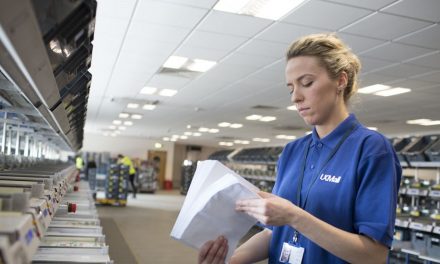
The rise and shine of hybrid mail
Colin de Vries, owner and founder of BlueMailCentral.com, writes exclusively for Post&Parcel. “The first mile” in postal terminology is the journey a letter takes from the sender to the post office. To replace the first mile by sending the document in a digital format to the post office is called Hybrid mail.
Hybrid mail has been the designated future for postal services since 1975 when Herbert H. Chapman filed the whole concept with the US patent office. That was 16 years before the Internet became something the average individual could use. One could say he was a visionary ahead of his time.
Yet only now, almost 35 years later, you see the rise of Hybrid mail amongst the main stream postal services and it’s getting accepted more and more within companies as the best way to communicate with customers.
But before we continue our story it’s very important to make sure that everybody agrees on what I mean by Hybrid Mail. The term is (ab)used in such a way that four people can claim to be in the Hybrid Mail business and they all are doing something completely different.
I would like to set the definition as follows: Hybrid mail is the process where an automated system prints and posts a digital document as close as possible to the receiver even crossing countries and political borders. To avoid any confusion I would like to introduce the term E-class as the 3rd option next to 1st and 2nd class mail. By doing so we immediately establish the correct position for this product in the postal market.
When you send out 1st or 2nd class letters, you most likely are familiar with the hassle of printing/folding/stamping and walking through the rain to the nearest letterbox to get that invoice or letter to the addressee. E-Class letters don’t have that problem, you simply hit the send button on your computer and within a couple of days the letter drops on the doormat of addressee thanks to the printing company and the devoted mailman/woman who handled your letter the last mile.
The beauty is that the sender wants to be able to send letters in the most convenient, efficient and/or cheapest way to meet the current business process. But the receiver would also like to be able to get the mail in the most convenient, efficient and/or cheapest way.
So, there is our dilemma, How do we keep everybody happy?
Ideally as a recipient of post, you would like specify how you want to receive all your letters but that would be a logistical nightmare for the senders. Of course someone could build a private company and offer the service. But with all the selling of personal/confidential information in this day and age users would have a hard time trusting such a company.
And that is where the postal companies come in. I trust my postal company for not abusing the information in my letters, and I trust the people who took the post oath to postal secrecy.
With the rise of e-mail the volume of letters has dropped significantly but postal companies are here to stay because currently only a third of the world population has access to a computer.
Closing this communication gap and filling the needs in regards to personal letter receiving methods will become the new challenge for postal companies. They have to build a “preferred method of communication” database of all addresses in their respective countries. Companies and private persons who want to send letters simply use the E-Class format and the postal company routes the message in the desired format (E-Class, E-Mail, Fax, E-invoice etc) to the addressee. Some postal operators are already looking in to projects like these.
The main bottle neck here is that if we want to succeed all postal companies must comply with a world wide E-class standard to enable cross border delivery of documents. That’s why I encourage you to call your favourite postal operator and tell them: “Postal companies of the world – UNITE!”
Colin de Vries is the owner and founder of BlueMailCentral.com – a hybrid mail solution provider with printing locations all over the world. Please visit BlueMailCentral.com for more information.
Triangle Management Services has released a definitive study on Hybrid Mail. For more information on the report, click here.












